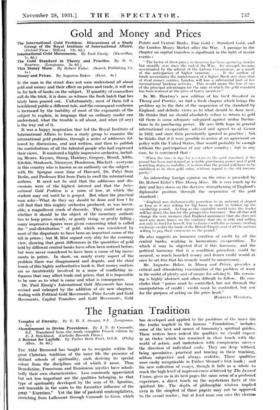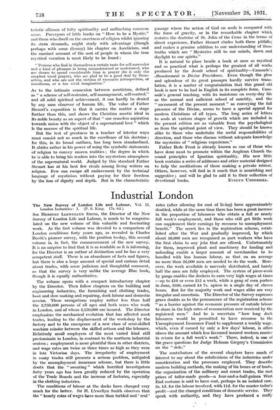The Ignatian Tradition Temples of Eternity. By B. H. J.
Steuart, S.J. (Longinans.
5s.) Abandonment to Divine Providence. By J. P. de Caussade, S.J. Translated from the tenth complete French edition by E. J. Strickland. (Catholic Records Press.) A Retreat for Layfolk. By Father Bede Frost, O.S.B. (Philip Allan. 3s. fkl.)
THE Abbe Bremond has taught us to recognize within the great Christian tradition of the inner life the presence of distinct schools of spirituality, each deriving its special colour from the disciplines out of which it arose. Thus Benedictine, Franciscan and Dominican mystics have admit- tedly their own characteristics. Less commonly appreciated but not less important are the _qualities belonging to that type of spirituality developed by the .sons of St. Ignatius, . and- traceable in the main to the formative influence of the great " Exercises," Yet the line of pastoral eontemplatives, stretching from Lallemont through Caussade to Grou, which has developed and applied to the problems of the inner life the truths implicit. in the famous " Foundation," includes some of the best and sanest of humanity's spiritual guides. These writers have . indeed . the qualities we should expect in an Order which has remained in close touch with the world of action, and undertaken with conspicuous success the direction of individual souls. They are deep without being speculative, practical and bracing in their teaching, seldom subjective and always realistic. These qualities were easily recognizable in Father Steuart's first book ; and his new collection of essays, though it fails as a whole to reach the high level of impressiveness achieved by The Inward Vision, gives us in its best pages the same sense of a profound experience, a direct touch on the mysterious facts of the spiritual life.. The depth . of philosophic wisdom implied even in the simplest of these . papers may. not be apparent to the casual reader ; but at least none can miss the • charao.
teristic alliance of lofty spirituality- and unflinching common sense. Purveyors of little books on " How to be a Mystic," and those who dwell on the sweetness of religion whilst ignoring its stern demands, might study with advantage (though perhaps with some dismay) his chapter on Asceticism, and the succinct account of the sort of people in whom the true mystical vocation is most likely to be found :
" Persons who find in themselves a certain taste for self-surrender and a kind of pleasure in being misunderstood or underrated, who are drawn to spend considerable time in prayer (be it only the simplest vocal prayer), who are glad to be a good deal by them- selves, and who are not the victims of excessive introspection, or moodiness, or a too vivid imagination."
As to the intimate connexion between asceticism, defined as " a scheme of self-restraint, self-management, self-control," and all solid spiritual achievement, it can hardly be denied by any sane observer of human life. The value of Father Steuart's exposition is that it carries the matter a stage further than this, and shows the Christian ascetic ideal in its noble beauty as an aspect of that " one ceaseless aspiration towards union with the object of a supernatural love " which is the essence of the spiritual life.
But the test of greatness in a teacher of interior ways must consist not so much in the excellence of his doctrine ; for this, in its broad outlines, has long been standardized. It abides rather in his power of using the symbolic statements of religion to convey unseen realities ; the degree in which he is able to bring his readers into the mysterious atmosphere of the supernatural world. Judged by this standard Father Steuart has at his best few rivals among living writers on religion. Few can escape all enslavement by the techniwwl language of mysticism without paying for their freedom by the loss of dignity and depth. But in the characteristic passage where the action of God on souls is compared with the force of gravity, or in the remarkable chapter which restates the doctrine of St. John of the Cross in the terms of direct experience, Father Steuart eludes both these pitfalls; and makes a genuine addition to our understanding of those truths which are " Mysteries still to our minds, dawn ,and daylight to our spirits."
It is natural to place beside a book at once so mystical and so practical what is perhaps the greatest of all works produced by the Jesuit school of spirituality—Caussade's Abandonment to Divine Providence. Even though the glow and splendour of its great passages hardly survive trans- lotion, it is a matter of congratulation that this grand old book is now to be had in English in its complete form. Cans- sade's general teaching, with its insistence on every-thy life as the normal and sufficient school of sanctity, and the
sacrament of the present moment " as conveying the full presence of the Divine, seems to have a special appeal for modern Christians of all types. The long series of letters to souls at various stages of growth which are included in the present edition are as valuable from the psychological as from the spiritual point of view. They should be known alike to those who undertake the awful responsibilities of direction, and those who discuss without adequate knowledge the mysteries of " religious experience."
Father Bede Frost is already known as one of those who have done most to promote within the Anglican Church the sound principles of Ignatian spirituality. His new little book contains a series of addresses and other material designed to help the meditations of those making a private retreat. Others, however, will find in it much that is nourishing and suggestive ; and will be glad to add it to their collection of







































 Previous page
Previous page